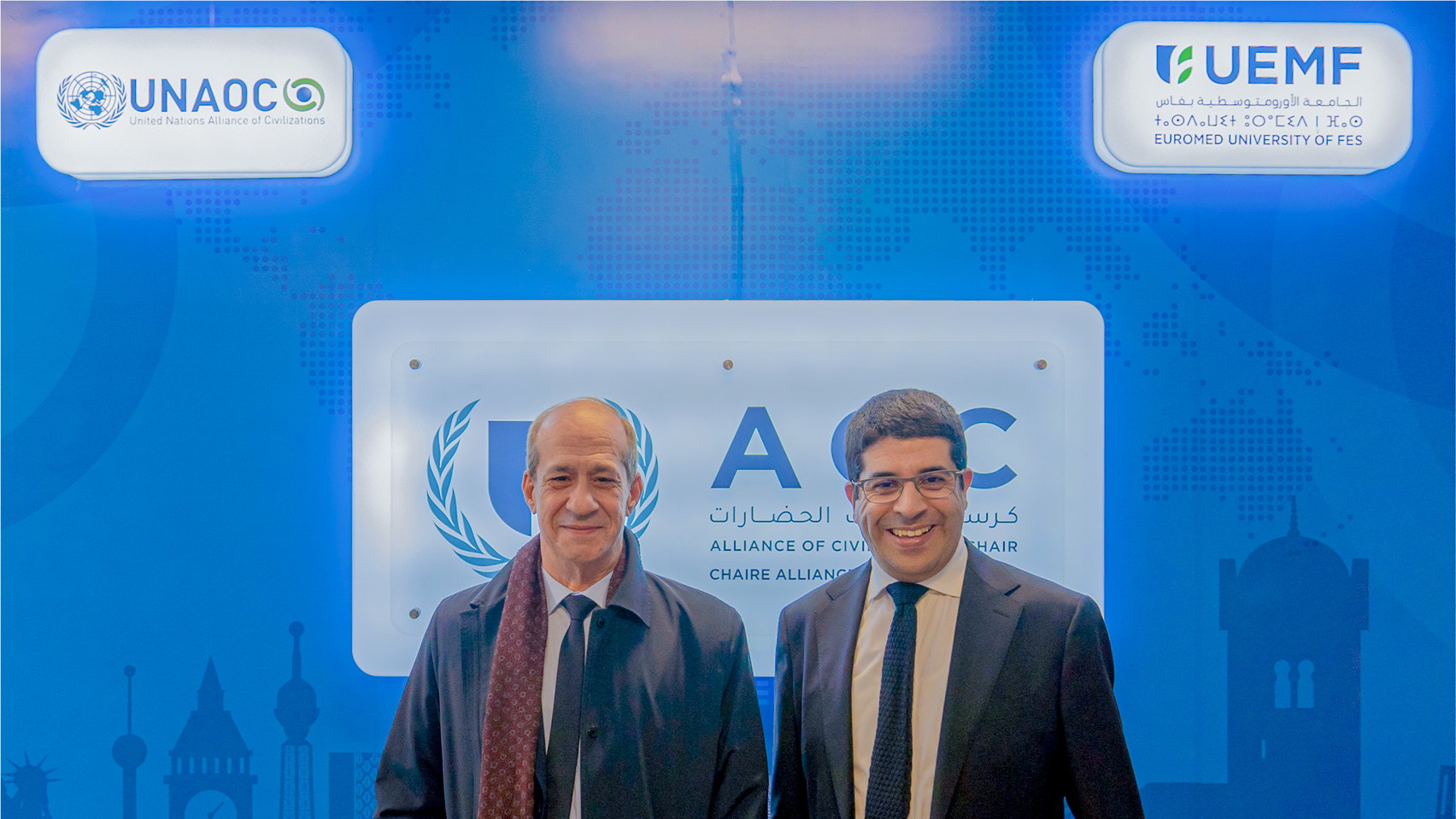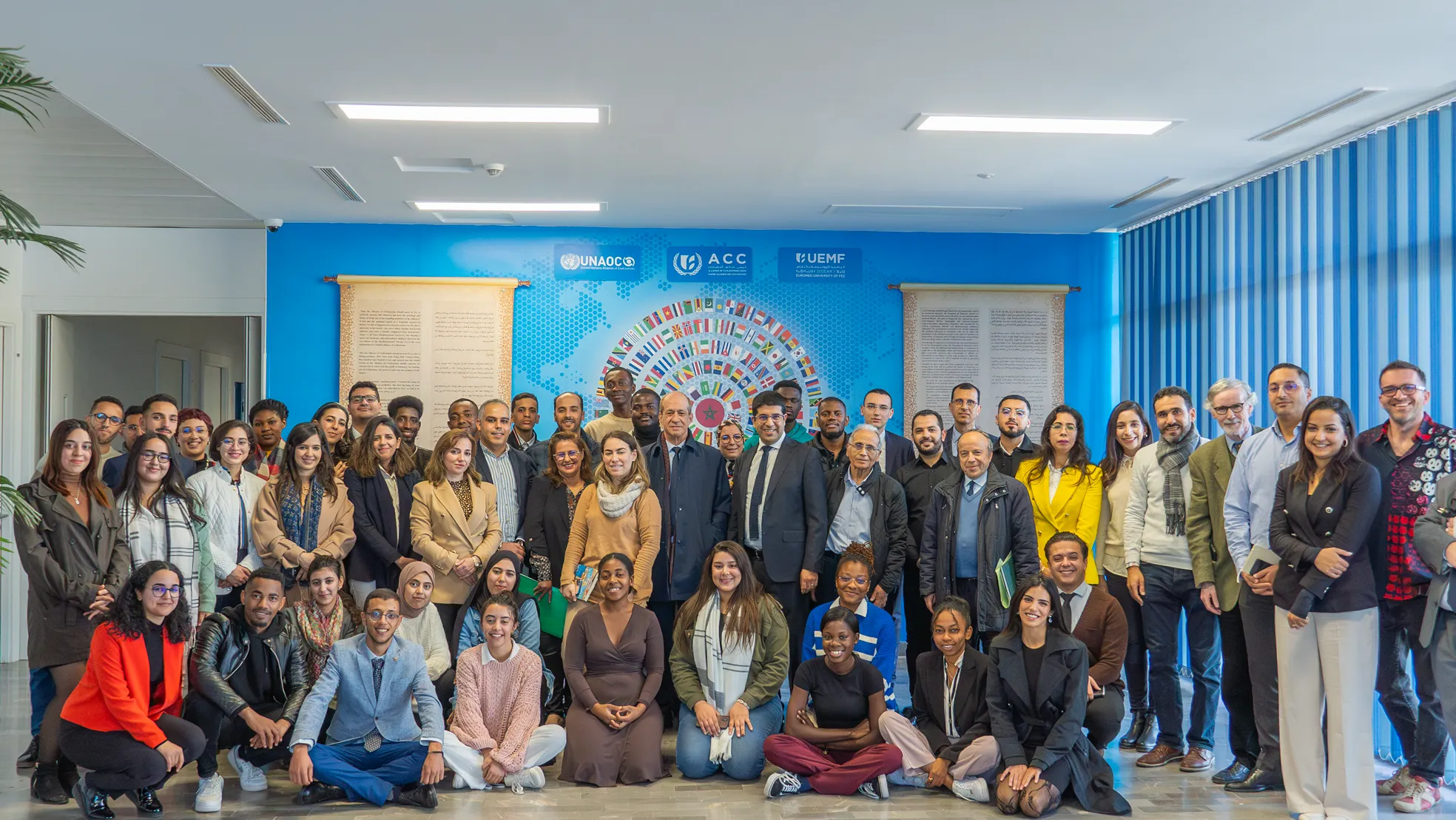Interview with Prof. Abdelhak Azzouzi

In an interview, Prof. Abdelhak Azzouzi of the Euromed University of Fez talks about the establishment of the Alliance of Civilizations Chair. He shares insights on its mission to promote peace through education, the significance of its location in Fez, and the launch of pioneering academic programs aimed at fostering intercultural dialogue and understanding.
Can you provide us with some background on how the Alliance of Civilizations Chair at Euromed University of Fez was established?
The establishment of a University Chair dedicated to the Alliance of Civilizations was decreed during the 9th Edition of the UNAOC Forum on the Alliance of Civilizations, held in Fez on November 22-23, 2022 in the presence of UN Secretary-General H.E. António Guterres and the United Nations High Representative for the Alliance of Civilizations (UNAOC) H.E. Miguel Ángel Moratinos Cuyaubé, among others. It is worth noting that H.E. Moratinos has been carrying out historic work within UNAOC, striving for a mutually beneficial and reciprocal understanding among societies, and working towards the eradication of factors contributing to the spread of hatred, racism, and supremacy.
The Chair is created in partnership with the UNAOC of the United Nations. It is indeed becoming increasingly necessary in today’s context marked by turbulent resurgences of religious and identity-based tensions, escalating economic crises, and worsening rises in fundamentalism that are tearing the world apart. Against the logic of confrontation, regardless of its pretexts and reasons, isn’t it the vocation of every university to teach not only science but also the knowledge of openness to fraternal understanding, fostering a taste for elective affinities beyond differences?
This is what the Euromed University of Fez has been committed to since its establishment. Because the mission assigned to it by royal decree emphasizes the creation of academic and scientific programs and structures capable of educating students in various disciplines and specialties to embrace the values of civilizational dialogue and intercultural exchange.
This mission holds a profound historical and epistemological significance. On one hand, it claims the heritage of Al-Quarawiyin University (historically one of the world’s first continuously operating universities) in promoting disciplines that reconcile faith and reason, with the aim of strengthening the bonds of coexistence in the whole world. On the other hand, the choice of Fez for establishing the Chair is beneficial. Throughout its history, this city has been the crucible in which these components have intersected and combined with the diverse elements that make up the Moroccan identity, including Andalusian, Afro-Saharan, Amazigh, and Jewish elements. It has also been a model of coexistence between civilizations and cultures. All of this makes this flourishing city not only a historical legacy to the Moroccan people but also a universal common heritage, recognized as such by international institutions and by all visitors to the city, including eminent thinkers and prominent figures from around the world.
What is the mission of the Chair?
We rely on the reference made by His Majesty King Mohammed VI to the mission of our University, in the Message sent to participants of the 9th edition of the UNAOC Forum on the Alliance of Civilizations held in Fez, where he solemnly states: “That the Alliance of Civilizations should meet in Fez is perfectly natural. Did Morocco not have the privilege and honor of being one of the founding members of the Alliance? Is Fez not the spiritual
capital of a Kingdom steeped in history? Is the Al-Quarawiyin University in Fez not the oldest university in the world – the place where Muslim and Jewish scholars, and even a pontiff, completed their instruction? Today, is its Euro-Mediterranean University not shaping a space for academic and intercultural dialogue between the two shores of the Mediterranean? Clearly, Fez is the very incarnation of a fruitful alliance of civilizations”. It is undeniable that this royal message makes us aware that the dialogue among civilizations cannot be merely a circumstantial narrative, but rather a paradigm to be constructed within and through university education.
The Alliance of Civilizations Chair has an academic and scientific mission as it aims at promoting research, education, and consulting in the field of the Alliance of Civilizations. Throughout the academic year, it offers a rich and diverse program of scientific and cultural activities designed to educate students from various academic levels and specialties in the values of civilizational dialogue and intercultural exchange. It serves as a relay for a multitude of teachings and knowledge as they evolve in the current context marked by epistemological shifts and changes in thought paradigms.
The scheduled activities include various types: training and reflection seminars; colloquia; exchange missions (actions involving the exchange of teachers and students as part of academic, scientific, and cultural cooperation missions); promotion and communication (through the Chair’s website, social networks, and media); consulting (conducting in-depth studies and reports for public or private organizations, as part of international development efforts); publications (books, e-books, journals, catalogs, reports, etc.).
Furthermore, the Chair benefits from unwavering support and assistance from Professor Mostapha Bousmina, the President of Euromed University of Fez, whom I am proud to call my friend. Allow me to express here and now that he has succeeded in a handful of years in transforming a field scattered with wild herbs and stones into a prominent center of learning and knowledge radiating across the Mediterranean and Africa. As confirmed by various international ranking systems, our University, confidently ranks first, second, or third as a hyper-performing university in the fields of ecology and sustainable development, forward-looking and innovative research, gender equality, commitment to excellence… Is it a coincidence?
The Chair’s team consists of sixty members from all continents. Based on each member’s geographical spheres of interest, which represent a highly diverse sampling of countries or regions, the Chair established a network of specialists from all over the world, enabling it to consequently expand its areas of activities. Furthermore, we are honored to have these distinguished Egyptian personalities as members of the Chair: Mohamed M. Abou El Enein, Mohamed El Orabi, Osama Hassan Heikal, Sami Al-Sharif and Mokhtar Omar…
The Chair is supervised by the Board of Directors of the Euromed University of Fez, which includes prominent Moroccan and international figures. During its meetings, the activities of the Chair will be discussed and evaluated based on a report presented by the Chair’s President.
What about the training programs?
The Chair aligns with the priorities of Euromed University of Fez and UNAOC regarding peace education through:
• Promoting intercultural dialogue.
• Spreading the culture of conflict resolution through wisdom and respect for international law.
• Dynamically reclaiming civilizational heritages to overcome obstacles (ethical and political) that prevent considering the sources of conflict from perspectives other than resorting to violence.
• Participating in consulting services and international expertise related to its field of activities. The Chair will conduct strategic studies and in-depth reports on behalf of public or private organizations, serving as vital decision-making tools within the framework of the Alliance of Civilizations.
Could you tell us about the Master’s program and the Doctoral School of the Chair?
One of the reasons motivating the establishment of this master’s program by the Chair, stems from this frequently asked question in various academic and university circles: what should be done to meet the needs for peace in a world increasingly plagued by violence and loss of values? Once again, it seems imperative to respond to this question through education, as it is the only possible way to strengthen our society’s ability to face the threats of the future.
We have launched an exclusive Master’s program focusing on the theme of “Conflict Resolution and Alliance of Civilizations”. We enrolled the first class of students from various nationalities. The courses are taught by renowned Moroccan and international academics, diplomats, senior officials, etc. This Master’s program aims at training true specialists in geopolitical analysis and peaceful conflict resolution through an ambitious multidisciplinary theoretical and practical training.
Built at the intersection of various fields of knowledge, the master’s program derives its originality and innovative character from the way it synergizes historical and epistemological approaches, legal and political resources, communication and semiotics, ethics and philosophy, geopolitics and international relations… All of this is achieved through an educational approach that is both explanatory and analytical, focused on acquiring skills in studying the conflictual issues of our time, and in constructing mechanisms for their resolution as well as for education in peace and the values of civilizational dialogue. It is evident that, in highlighting this aspect, the educational team of the master’s program seeks to highlight both its recognition of the complexity of the issues within the field and its commitment to overcoming them. Furthermore, a doctoral school dedicated to the Alliance of Civilizations has been established. This doctoral school benefits from the contributions of the Chair, the support of the University’s Doctoral Studies Center and the existing collaborations with doctoral schools at Mediterranean and international universities.



